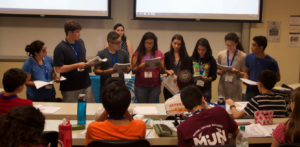
Student life is full of activities, both academic and social. Excitement at the start of your educational journey can often rapidly give way to anxiousness, and learning to cope with this is essential.
As a student, you already experience stress on a daily basis as you make your way to classes, attend lectures, write papers, take exams, and are expected to speak out in class and ask questions. It can all become overwhelming, and learning ways to cope with student-related stress will be a needed skill, helping to keep you away from unhealthy habits such as substance abuse and addiction.
One way you can expand these coping skills and keep your mental health in balance is by being in a Model United Nations (UN).
The Model UN, a simulation activity mirroring a United Nations conference, tasks students with solving an issue of global importance, requiring research, lobbying, and debate to achieve a solution. These real-world issues may include terrorism, human rights, nuclear proliferation, the environment, or many others.
How can being in a model UN benefit your mental health? Here are five important ways.
1. Experience a Sense of Belonging

According to psychologists, one of the telltale signs that someone is experiencing good mental health is a feeling of a strong sense of belonging. That is, you feel a connection or belonging with a community and feel you are contributing in some valuable way.
A sense of belonging includes feeling supported and secure. You bring your authentic self into the experience, feeling accepted and included.
The interactions you experience while participating in the Model UN create community. As you immerse yourself in the various roles, you are part of that community, and you feel a unique sense of belonging, which is reassuring and foundation forming.
2. Build Self-Esteem and Confidence
Serving in a Model UN role boosts your self-esteem and confidence levels.
There is a connection between how you feel about yourself and your mental health and emotional wellbeing. Someone with low self-esteem lingers in negative feelings, feeling they are unworthy. This is damaging to mental health as low self-esteem in childhood can often lead to escaping into substance abuse and addiction later on.
Confidence is also important for all that you do, and developing that confidence and learning to trust in it can help you both now and in the future. It’ll help you in high-pressure situations and in effectively expressing yourself. When it comes to strong mental health, you have to know when to say no and when to stand up for yourself. The Model UN provides you with the experience of debate and to practice courage in voicing what you know.
Participating in a Model UN also aids in the development of social confidence. By working in teams, students develop social skills and build confidence, leading to more effective communication. You’ll also gain practice in public speaking, becoming more comfortable and confident with conveying your thoughts and ideas in front of others.
3. Develop and Maintain Healthy Relationships

A characteristic of good mental health is the ability to develop and maintain good relationships. This includes the ability to treat others fairly and to avoid toxic people. Being in a Model UN teaches you these skills and helps you work with other students of different backgrounds and viewpoints without dismissing the potential for building a friendship or showing respect for the other person.
Being a part of a Model UN also allows you to express yourself as you meet new people and also listen to what they have to say.
As a bonus, the ability to develop healthy relationships with friends and classmates sharing the Model UN experience provides additional support, including for when you experience outside stressors.
As a student, you may at times feel isolated from others or may unintentionally isolate yourself. By avoiding others, you may be hurting your mental health more than you realize. Being a part of a Model UN delegation presents opportunities to network and obtain friendships you might never have known were available.
4. Establish Focus and Concentration Skills

Delegates raising their placards @ SSUNS!
With so much grabbing your attention every day, you can become lost in scattered thoughts, experience short attention spans, and essentially be unable to achieve your goals. Anxiety often results, and your mental health is challenged as you try to figure out why you never complete anything.
By becoming focused, your attention is centered and geared to achieving an objective or goal. Being in a Model UN gives you practice in establishing focus and learning to concentrate more efficiently.
How does this happen? Your role in the Model UN requires mental effort, which means you engage your brain and focus your attention. You’ll then see the results, which can be encouraging and reduce stress.
A few ways to help you focus and concentrate, including when fulfilling your Model UN role, include:
- Establish specific, clear goals for what you wish to accomplish,
- Break larger tasks down into a set of smaller ones, making the project more manageable, and
- Set reasonable deadlines for each smaller task.
5. Develop Problem-Solving Skills

Learning how to efficiently solve problems is a mental health benefit you’ll use throughout your life. The Model UN puts you in situations ideal for honing analytical skills, which help in problem-solving. You’ll continuously be challenged to present acceptable resolutions to tasks and problematic issues, refining the way you go about solving them.
Along with these analytical skills, you’ll also experience how to deal with conflict and negotiate for an acceptable outcome.
Takeaway: Participating in a Model UN can be highly beneficial to your mental health and help you develop skills you’ll need both now and in the future.
Sources
sunshinebehavioralhealth.com – Toolkit: Stress and Students
mentalhealth.gov – What is Mental Health?
fsu.edu – Sociologists find low self-esteem at age 11 predicts drug dependency at 20
amherst.edu – 10 Tips for healthy relationships
gwu.edu – How to Increase Attention Spans: Exercises, Tips, and Resources
fitnyc.edu – Develop Better Concentration for Learning and Study




